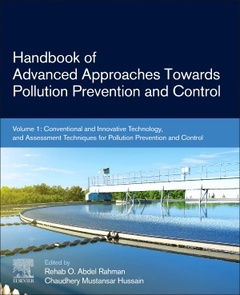Handbook of Advanced Approaches Towards Pollution Prevention and Control Volume 1: Conventional and Innovative Technology, and Assessment Techniques for Pollution Prevention and Control
Coordonnateurs : Rahman Rehab O Abdel, Mustansar Hussain Chaudhery

1. Wastewater treatment technologies2. Advanced oxidation processes, non-conventional environmental engineering techniques and environmental sustainability3. Endocrine disrupting chemicals removal by carbon nanocomposites4. Synthesis and characteristics of carbon-doped nanomaterials for dyes removal5. Applications of catalyzed redox processes in water remediation6. Waste management using Plasma based treatment7. Pyrolytic methods of municipal solid waste conversion in bio-fuel8. Food waste Management9. Potential of turning rice straw into paper in Tanzania: a mechanism for reducing air pollution10. Soil remediation technologies11. Management of technologically enhanced naturally occurring radioactive materials12. Nano-waste: environmental and human health risk13. Introduction to polychlorinated biphenyls (pcbs) environmental pollution and its impact on the sustainability of life14. Arsenic pollution and human health issues - special reference to the Bengal Delta15. Utilization of microsensors for air quality monitoring system16. Mitigation hierarchy: an effectiveness of project control mechanism
Dr. Rehab O Abdel Rahman is a Professor of Chemical Nuclear Engineering at Hot Laboratories for the Egyptian Atomic Energy Authority (EAEA) in Cairo, Egypt. She worked for more than 25 years in supporting the licensing of radioactive waste management facilities and participated in international projects on the development and implementation of safety cases and safety assessment for those facilities. Her widely published research focuses on radioactive waste management. She supervises post graduate students, teaches undergraduate courses, and supports training activities within EAEA, serves as a member in international scientific committees. She has editorial experience as a managing editor for international journals, guest editor for special issues, and editor of several books, and frequent contributor on the topic of hazardous waste management.
Chaudhery Mustansar Hussain is an adjunct professor and director of laboratories in the Department of Chemistry and Environmental Sciences at the New Jersey Institute of Technology (NJIT), Newark, New Jersey, United States. His research is focused on the applications of nanotechnology and advanced materials, environmental management, analytical chemistry, and other various industries.
- Provides in-depth information on the principles and advances in pollution prevention and control practices
- Discusses emerging technologies and processes for advanced pollution prevention and control
- Presents developments on the use of the assessment models as tools to support the research and applications of different technologies and processes
- Provides history, fundamentals, state-of-the-art, and future trends
- Edited by expert team of world-class editors
Date de parution : 01-2021
Ouvrage de 364 p.
19x23.3 cm
Thèmes de Handbook of Advanced Approaches Towards Pollution... :
Mots-clés :
?Activated carbon; Advanced; Advanced oxidation processes; Air quality; Arsenic; Arsenic intoxication; Arsenic toxicity; Arsenicosis; Avoidance; Bengal Delta; Biofuel; Biological treatment; Biorefinery; Bioremediation; Carbon dioxide; Carbon nanocomposite; Carbon-doped nanomaterial; Carrier gas on the efficiency of plasma torch; Catalysis; Catalytic pyrolysis; Characterization; Chemical remediation; Coagulation; Compensation; Cooling of plasma electrodes on erosion rate of electrode; Drinking water; Dye; EIA follow-up; Endocrine-disrupting chemical; Environmental; Environmental impact assessment; Environmental pollution; Environmental risk; Food waste; Green methods; Groundwater; Hazardous; Health hazards; Human health; Mechanism; Microsensors; Minimization; Mitigation hierarchy; Municipal solid waste; NORM; Nanomaterials; Nanowaste; Nontransferred plasma torch; Offsetting; Oxidation; Paper manufacturing from rice straw; Particulate matter; Petroleum exploration and production projects; Physical remediation; Phytoremediation; Pollutants; Pollution; Pollution control; Polychlorinated biphenyls (PCBs); Public health; Pyrolysis products; Pyrolysis reactors; Pyrolytic conversion; Radiation; Radioactive; Radionuclide; Rectification; Redox processes; Reduced toxin emission with plasma treatment; Remediation; Rice straw management; Sedimentation; Soil pollution; Solvent extraction; Sustainability; Synthesis; TENORM; Tanzania; Thermal remediation; Treatment plant; Turning crop residues into wealth; Un-segregated waste treatment; Valorization; Vision; Waste; Wastewater; Wastewater properties; Wastewater treatment; Water; Zerowaste



